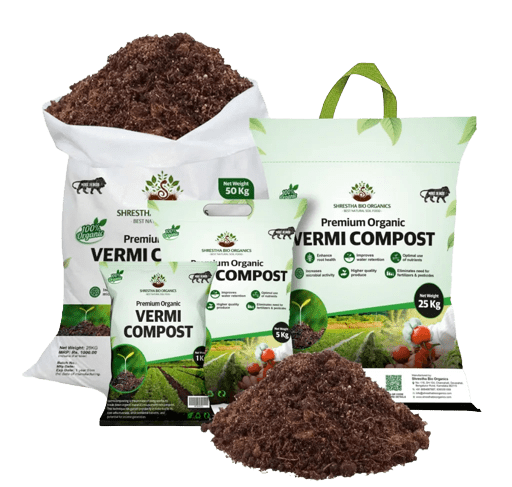What is vermicompost?
Shrestha Bio Organics is Premium Quality Vermi Compost Supplier in India for all of your Vermi Compost Needs.
How is vermicompost different from regular compost?
Vermicompost is produced by using earthworms to break down organic materials, whereas regular composting relies on the natural decomposition process without the involvement of worms. Vermicompost tends to have higher nutrient content and microbial activity, making it an excellent soil amendment.
What are the benefits of using vermicompost?
Using vermicompost in gardening or agriculture provides numerous benefits. It enriches the soil with essential nutrients, improves soil structure and drainage, enhances water-holding capacity, promotes beneficial microbial activity, suppresses plant diseases, and increases plant growth and yield.
How do I make vermicompost at home?
To make vermicompost at home, you will need a vermicomposting bin or container, bedding material (such as shredded paper or leaves), kitchen scraps, and red worms (Eisenia fetida or Lumbricus rubellus). Layer the bedding and organic waste in the bin, add the worms, and maintain appropriate moisture and temperature levels. The worms will consume the organic matter and convert it into nutrient-rich vermicompost.
Can I use any type of earthworms for vermicomposting?
Not all earthworm species are suitable for vermicomposting. Red worms, commonly known as red wigglers or tiger worms (Eisenia fetida and Lumbricus rubellus), are the most preferred species for vermicomposting due to their efficient consumption of organic waste and rapid reproduction.
What materials can be used for vermicomposting?
You can use a variety of organic materials for vermicomposting, including fruit and vegetable scraps, coffee grounds, tea leaves, crushed eggshells, shredded paper, cardboard, yard trimmings, and plant-based kitchen waste. However, avoid using meat, dairy products, oily foods, and non-biodegradable materials.
How long does it take to produce vermicompost?
The time required to produce vermicompost depends on various factors such as the size of the vermicomposting system, the amount and type of organic waste, environmental conditions, and the efficiency of the worm population. Generally, it takes around 2-6 months for the vermicomposting process to be completed.
Can vermicompost be used for indoor plants?
Yes, vermicompost is excellent for indoor plants. It enriches the soil, improves moisture retention, and provides essential nutrients to support healthy growth. Mix vermicompost with potting soil or use it as a top dressing around the base of indoor plants for optimal results.
Is vermicompost safe for organic gardening?
Absolutely! Vermicompost is a natural and organic fertilizer that is safe for use in organic gardening. It is free from synthetic chemicals and pesticides, making it an eco-friendly choice for nourishing plants and improving soil health.
Where can I buy vermicompost?
Vermicompost is available for purchase at garden centers, nurseries, and some agricultural supply stores. You can also find it online through various retailers and organic farming websites. Additionally, you can make vermicompost at home using a vermicomposting system.
Can vermicompost be used in hydroponics or aquaponics systems?
Yes, vermicompost can be utilized in hydroponics or aquaponics systems. It helps introduce beneficial microorganisms and provides essential nutrients to support plant growth in these soil-less cultivation methods. However, it's important to ensure proper filtration and prevent clogging of the system.
How much vermicompost should I use in my garden or potted plants?
The amount of vermicompost to use depends on the specific needs of your plants and the condition of your soil. As a general guideline, you can mix 10-20% vermicompost by volume with your garden soil or potting mix. Adjust the ratio based on the plant's requirements and monitor the response of your plants.
Can vermicompost help improve soil fertility in degraded or contaminated soils?
Yes, vermicompost can be beneficial for improving soil fertility in degraded or contaminated soils. The organic matter and beneficial microorganisms present in vermicompost can help restore soil structure, enhance nutrient availability, and promote the breakdown of certain contaminants, thus aiding in soil remediation.
Does vermicompost have any specific pH requirements?
Vermicompost tends to have a neutral pH, typically ranging from 6.5 to 7.5. This pH range is suitable for most plants and supports optimal nutrient availability. However, it's always a good practice to test the pH of your vermicompost and adjust it if necessary by adding amendments like lime or sulfur.
Can vermicomposting be done on a large scale for commercial purposes?
Yes, vermicomposting can be scaled up for commercial production. Large vermicomposting operations involve specialized systems like windrows or stacked beds to accommodate a higher volume of organic waste. Commercial vermicompost production can cater to the needs of agriculture, horticulture, landscaping, and other industries.
What are the challenges or common issues in vermicomposting?
Some common challenges in vermicomposting include maintaining appropriate moisture levels, preventing odor or pest problems, avoiding overfeeding the worms, and managing the temperature within the desired range (around 55-77°F or 13-25°C). These issues can be addressed through proper management techniques and monitoring.
Is vermicompost suitable for all types of plants?
Vermicompost is generally suitable for a wide range of plants, including flowers, vegetables, herbs, fruits, and trees. However, certain plants with specialized nutrient requirements or specific soil preferences may need additional amendments or adjustments in combination with vermicompost.
Can vermicompost be used as a foliar spray?
Yes, vermicompost can be used as a foliar spray by diluting it with water. The nutrient-rich liquid extract obtained from vermicompost, often referred to as "worm tea," can be sprayed on the leaves of plants to provide nutrients and stimulate growth. This can be particularly useful for quick nutrient uptake and foliar feeding.
How should vermicompost be stored to maintain its quality?
To maintain the quality of vermicompost, store it in a cool, dry place away from direct sunlight. Properly sealed bags or containers can help prevent moisture absorption and maintain its nutrient content. Avoid storing vermicompost in high humidity areas or exposing it to extreme temperatures.
Can I vermicompost all year round?
Vermicomposting can be done throughout the year, provided that the environmental conditions are suitable for the worms' survival and activity. However, during extreme temperatures (very hot or very cold), it may be necessary to provide.

Vermicompost Manufacturer Exporter Premium Quality Vermi Compost Supplier in India Good Quality Vermi Compost Exporter in India Superior Quality Vermi Compost Manufacturer Vermi Compost Wholesaler in India Best Quality Vermi Compost Exporter VermiCompost Wholesaler in India Vermicompost Supplier in Bengluru Best Fertilizer Company in India Organic Fertilizer Manufacturing Company Organic Vermicompost Manufacturing Company in India Fertilizer Company in Bengaluru Vermicompost Manufacturing Company in India
Soil Fertilizer Manufacturing Company Vermi Compost Exporters in India Premium Quality Vermi Compost Manufacturer in India Best Fertilizers Exporter in India India’s Trusted Vermi Compost Seller Most Trusted Vermi Compost Exporter in India Best Natural Soil Food Manufacturer Premium Quality Vermi Compost Supplier What is Vermicompost? How do i make vermicompost at home? Can Vermicompost be used for indoor plants? is Vermicompost suitable for all types of plants?


